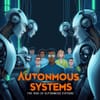Autonomous AI agents are revolutionizing industries and transforming the way we work. These advanced systems possess the remarkable capacity for self-directed task decomposition, planning, and iterative execution without continuous human intervention. They're designed to operate independently, setting their own goals, making decisions, and taking actions to achieve specific tasks without constant human oversight.
Imagine having a personal assistant that anticipates your needs, or a business that operates smoothly through AI-powered networks. Autonomous AI agents can automate complex processes, personalize customer experiences, optimize logistics, and even generate creative content. Their power lies in adapting and learning as they go, often improving their performance over time.
- Healthcare: AI-powered diagnostics assist doctors in detecting diseases with high precision, while AI agents can monitor patient vitals 24/7 and detect subtle changes indicative of impending health crises.
- Finance: AI trading bots analyze market trends and execute trades faster than humans, optimizing portfolios and detecting trading opportunities.
- Customer Service: Chatbots provide instant responses and streamline customer interactions, while AI agents can manage customer relationships over time, anticipating needs before they arise.
- Software Development: AI agents can write, test, and debug code, producing code snippets, detecting errors, and performing deployment tasks.
As AI agents become more sophisticated, they'll play a crucial role in decision-making processes, automation, and innovation. However, ethical concerns such as bias, security, and transparency must be addressed to ensure responsible AI development. With the evolution of multi-agent systems, AI-driven economies are heading toward self-sustaining ecosystems where intelligent agents interact, negotiate, and even trade autonomously.


